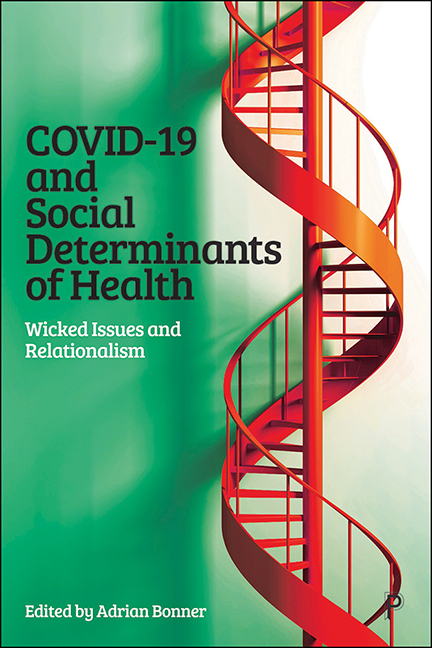Book contents
- Frontmatter
- Miscellaneous Frontmatter
- Contents
- List of figures and tables
- Notes on contributors
- Foreword
- Introduction
- Part I Wicked issues and relationalism
- Part II Regionalism and geopolitical environments
- Part III Public sector, COVID-19 and culture change
- Part IV The third sector
- Part V The case for relationalism
- Part VI Engagement and proposed changes
- Conclusion
- Appendix The Centre for Partnering
- Index
5 - Levelling up in the North and North-East England: complex and fragmented governance and the new National Health Service and local government partnerships
Published online by Cambridge University Press: 18 January 2024
- Frontmatter
- Miscellaneous Frontmatter
- Contents
- List of figures and tables
- Notes on contributors
- Foreword
- Introduction
- Part I Wicked issues and relationalism
- Part II Regionalism and geopolitical environments
- Part III Public sector, COVID-19 and culture change
- Part IV The third sector
- Part V The case for relationalism
- Part VI Engagement and proposed changes
- Conclusion
- Appendix The Centre for Partnering
- Index
Summary
Introduction
The 2020 book, Local Authorities and the Social Determinants of Health (Bonner, 2020) reported on the North East region of the United Kingdom, prior to the December 2019 UK election. The election brought Boris Johnson MP to power as British prime minister with commitments to both Brexit and to the ‘levelling up’ of Britain. Kunonga et al (2020) reviewed the response of the North East to austerity and reduced central government funding since 2010. They showed the scale of the North East challenge in towns and cities like Middlesbrough and Sunderland and highlighted the growing health and care gap in the North East. They argued for a more integrated approach to health and wellbeing and a whole-city and more focused place-based approach to address health inequalities, emphasising the need for long-term planning and long-term settlements to tackle health inequalities.
The 2019 general election proved cataclysmic for the Labour Party in the North East and across the North of England. Mattinson (2020) recalls: ‘[O]n the 12th December starting with Blyth Valley, I watched as seat after Labour seat collapsed to the Tories, challenging all conventional wisdoms about political tribalism. The Red Wall had turned Blue’ (Mattinson, 2020: 5). Boris Johnson promised a levelling up process to deliver a new policy agenda for the UK and address the UK North–South divide, particularly tackling the deep-seated inequalities in regions like the North East. However, in 2021 it was still not clear what ‘levelling up’ means and what the geographical focus is to be. A previous Cameron and Osborne Conservative commitment to the Northern Powerhouse (HMSO, 2021a) and the three regions of the North of England appears to have now faded. A Cabinet Office Levelling Up Unit has been appointed and Neil O’Brien MP has been put in charge of bringing forward a White Paper on Levelling Up, originally for the Autumn of 2021 eventually, delayed until 2022. A recent report from the Northern Health Alliance shows the deteriorating position for the Northern Powerhouse which encompasses the three Northern regions (Bambra and Munford, 2020).
- Type
- Chapter
- Information
- COVID-19 and Social Determinants of HealthWicked Issues and Relationalism, pp. 87 - 99Publisher: Bristol University PressPrint publication year: 2023

